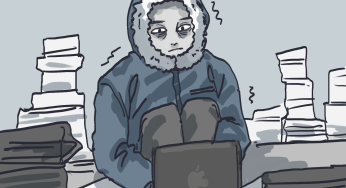EDITORIAL – National shield law no threat to security
Shield laws don’t only protect journalists, they safeguard the rights of every American… Shield laws don’t only protect journalists, they safeguard the rights of every American citizen. This country has no legitimate excuse not to enact a national law securing reporters’ rights to do what they do best: find and publish facts.
On the contrary, there are many reasons why a basic level of assurance is necessary for journalists to continue their work. Many are having second thoughts about writing stories that could result in subpoenas, largely because of New York Times reporter Judith Miller’s recent jailing. One of the primary roles of the press is to act as a watchdog over the government; if the government has the right to place a muzzle over the mouths of reporters, the country is left largely defenseless against federal fraud.
Currently, the only places in the United States without some sort of shield law keeping journalists from being forced to reveal their sources are Wyoming and the District of Columbia. If 49 states can agree that there is value in allowing journalists the right to remain silent, surely the nation can agree on a minimum standard of protection.
A lowest common denominator of shield laws needs to be calculated and enforced on a national level. States with more generous statutes should still be able to maintain their own shield laws; this would simply allow reporters who cover a national beat to investigate with some level of personal safety.
The primary concern with a countrywide shield law is that it would compromise national security by blocking prosecutors’ access to potentially critical information. This is not a sufficient reason to compromise the freedom of the press, one of the fundamental characteristics of the United States.
Journalists are not, and were never supposed to be, actors for the government.
There are several federal departments and billions of dollars dedicated to the country’s security and to keeping tabs on all relevant information. It is not the job of a reporter to step in when federal agencies fail to do their jobs thoroughly.
Even so, the federal shield being proposed would not be all-encompassing. The legislation, sponsored by Sen. Richard Lugar, R-Ind., and Rep. Mike Pence, R-Ind., would allow a provision for cases where identification of sources is, “necessary to prevent imminent and actual harm to national security.” Though this wording is somewhat vague, it would allow federal prosecutors to access information in the most dire situations.
The risk to national security posed by enacting a national shield law is minimal – it is the risk of strangling this country’s free press that merits real concern. If journalists are to continue holding the government accountable for its actions, their right to silence must be protected.
Recent Posts
SGB introduces new governing code bill and addresses rumors of ICE on campus
At its weekly meeting at Nordy’s Place on Tuesday, Student Government Board introduced an omnibus…
Opinion | School should be in the summer
Although this may be controversial, I believe that from this data, it is evident that…
Weathering the storm: Pittsburgh teams have tackled some of the toughest environments
The end of the year in western Pennsylvania is always marked by two things —…
Notes From an Average Girl // Notes on Book Banning
In this edition of Notes From an Average Girl, senior staff writer Madeline Milchman writes…
To Be Honest // Yup, it is that damn phone
In this edition of To Be Honest, staff writer Evin Verbrugge writes about her phone…
Meaning at the Movies | Portraying Toxic ‘Adolescence’
In this edition of Meaning at the Movies, staff writer Lauren Deaton explores the mini-series…




